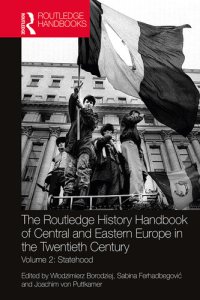
Ebook: The Routledge History Handbook of Central and Eastern Europe in the Twentieth Century: Volume 2: Statehood
Statehood examines the extending lines of development of nation-state systems in Eastern Europe, in particular considering why certain tendencies in state development found a different expression in this region compared to other parts of the continent.
This volume discusses the differences between the social developments, political decisions and historical experience that have influenced processes of state-building, with a focus on the structural problems of the region and the different paths taken to overcome them. The book addresses processes of building social orders and examines the contribution of state institutions to social and cultural integration and disintegration. It analyzes institutional and personnel continuities that have outlasted the great political changes of the twentieth century and addresses the expansion of state activity in shaping property relations in agriculture and industry as well as in social security and family politics. Taking a comparative approach based on experiential history, allowing individual experience to be detached from specific national references, the volume delineates a transnational comparison of problems shared within the region as they have been passed down through history, providing definition to the specificity of Eastern Europe and situating the historical experience of the region within a pan-European context.
The second in a four-volume set on Central and Eastern Europe in the twentieth century, it is the go-to resource for those interested in statehood and state-building in this complex region.
This volume discusses the differences between the social developments, political decisions and historical experience that have influenced processes of state-building, with a focus on the structural problems of the region and the different paths taken to overcome them. The book addresses processes of building social orders and examines the contribution of state institutions to social and cultural integration and disintegration. It analyzes institutional and personnel continuities that have outlasted the great political changes of the twentieth century and addresses the expansion of state activity in shaping property relations in agriculture and industry as well as in social security and family politics. Taking a comparative approach based on experiential history, allowing individual experience to be detached from specific national references, the volume delineates a transnational comparison of problems shared within the region as they have been passed down through history, providing definition to the specificity of Eastern Europe and situating the historical experience of the region within a pan-European context.
The second in a four-volume set on Central and Eastern Europe in the twentieth century, it is the go-to resource for those interested in statehood and state-building in this complex region.
Download the book The Routledge History Handbook of Central and Eastern Europe in the Twentieth Century: Volume 2: Statehood for free or read online
Continue reading on any device:

Last viewed books
Related books
{related-news}
Comments (0)